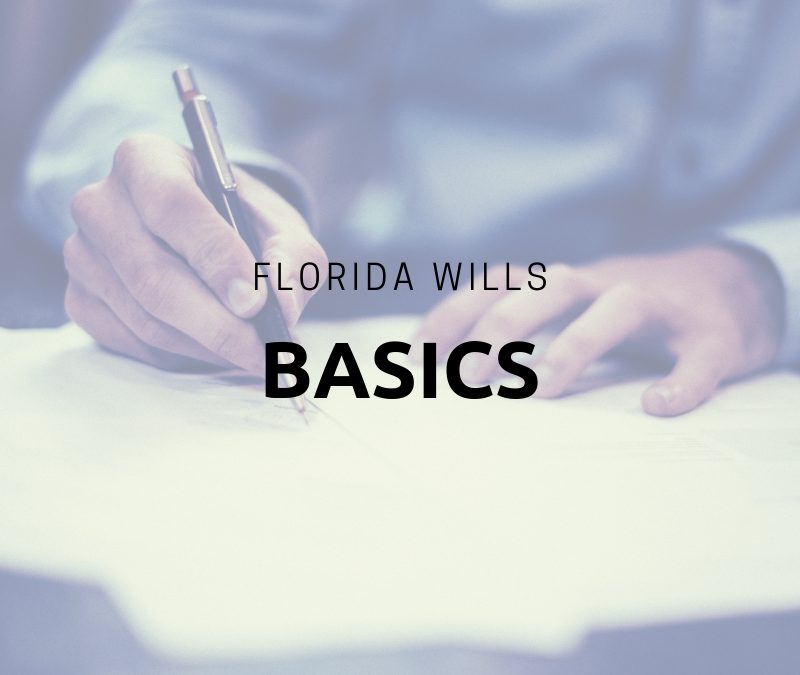Estate planning – leaving directions for what should happen to your belongings when you die – is something everyone should do, no matter how many or how few assets you have. Florida law provides for many ways to plan your estate, and one of the most well-known and most-used methods is the creation of a will.
The state of Florida defines a will as “an instrument, including a codicil, executed by a person . . . which disposes of the person’s property on or after his or her death and includes an instrument which merely appoints a personal representative or revokes or revises another will.” Fla. Stat. § 731.201(40).
Who Can Make A Florida Will?
In Florida, any florida citizen who is of sound mind and is at least 18 years old (or is an emancipated minor) can make a will. There are a few exceptions to the age requirement: married minors can make wills, and if a minor is in the military he or she can execute a military testamentary instrument.
What Must Be In a Florida Will?
Florida law requires wills to be in writing. Handwritten (also known as holographic) wills that do not follow the formal requirements for wills in Florida are not valid. Also, oral (also known as nuncupative) wills are not valid in Florida.
To be valid, the will must be signed by the testator (the person making the will) in the presence of at least two “attesting” witnesses. Each of those witnesses must sign the will in the presence of the testator and each other. These rules about signing and witnessing are upheld strictly by Florida courts – you’ll want to make sure you follow the law to the letter when executing your will.
When the testator dies, the will must be admitted to probate. At that point, the court needs to see proof that the will in front of it is valid. There are a few ways this can be accomplished. The easiest way is to “self-prove” the will when it is being executed. A Florida estate planning attorney can help testators get this right so that the court has no question about the will. Another way is to have the attesting witnesses come before the court and give testimony about witnessing the execution of the will. This can pose problems, though, if a witness dies before the testator or suffers from an infirmity that leaves their mental capacity in question. Finally, if the will is not self-proven and/or the attesting witnesses are not available, the personal representative named in the will may swear under oath that he or she believes the will in front of the court to be the true will reflecting the decedent’s wishes.
Although those are the main requirements to make a valid Florida will, there are many other things that can – and should – go into a will. For instance, the will should clearly identify itself as a will. It should explicitly revoke prior wills. And it’s also advisable to identify the domicile and the marital status of the testator. The best course of action is to consult with a Florida estate planning attorney to ensure you’ve included everything you should.
Can Florida Wills Be Challenged?
If someone wishes to challenge either the contents of or the validity of a will, the burden of proof is on the estate to establish that the will was formally executed in accordance with Florida law. After that, it’s up to the challenger to present evidence that something about the will is invalid or void. A will is typically found to be void if it was procured by fraud, duress, mistake, or undue influence.
Some Practical Considerations
Life is unpredictable, and sometimes people forget to update wills. Florida law provides guidance in some of these instances. For example, if someone executed a will before being married, but dies married, the law allows for the forgotten spouse to receive a share of the estate under what’s called the “Pretermitted Spouse Rule.” Same goes for forgotten children – Florida law provides that children born to the testator after the will was written may be entitled to a share of the estate as well. Divorces also may affect provisions of Florida wills, so it’s best to consult with your attorney about how to handle this sort of significant life change.
There are also practical considerations about where to keep a will. A will is no good if it can’t be found! The best thing to do is keep it in an accessible, easily-found location, and tell your attorney and personal representative where it is.
This is just a broad discussion of what goes into the drafting and execution of a Florida will. There are many details that we’ll discuss in future posts. In the meantime, don’t hesitate to contact the estate planning attorneys at Lynchard & Seely to schedule a free consultation to discuss your estate planning options.
Want Help With Your Estate Plan?
Click Below to Schedule a FREE Initial Consultation!
Lynchard & Seely – COVID-19 Update
We want to update you on the steps we are taking to ensure we can continue to meet your legal needs in a secure and reliable manner. This year marks our firm’s 20th year in Navarre, and our team remains fully operational and here to support you and our community...

3 Florida Estate Planning Documents You Need Right Now
Three, fairly simple Florida estate planning documents is all you need. While, other things can help more, these will get you by in a pinch.

Estate Planning For Small Business Owners
Estate Planning for Small Business Owners – You have to think about more when estate planning if you have a business.
Want Help With Your Estate Plan?
Click Below to Schedule a FREE Initial Consultation!

